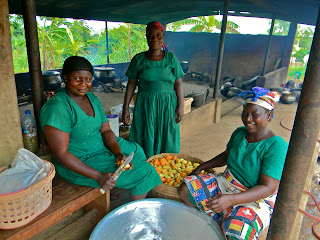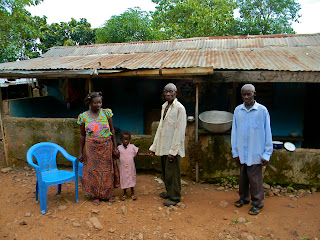By Cassie Bingham A comprehensive blog of my experience preparing for and conducting a 3 month field research project in Ghana, Africa. Here I will document my insights, notes, literary sources and more. The blog title is one of my favorite Passion Pit lyrics, and a good piece of advice for all inhabitants of the world! Please see my Project Proposal page for an overview of my project and proposed ethnographic field work.
Tuesday, May 29, 2012
Tuesday, May 22, 2012
An A-Cultural God
Random Journal Post #1
Tuesday, May 15, 2012
Finding my Footing, and Musings about the Variations of Man
PS: I will start posting a few photos, and selected parts of my journal entries each Tuesday, as well as insight posts like these, so watch out for those!
Thursday, May 3, 2012
First Impressions
Sunday, April 15, 2012
Fighting Fears
Friday, April 6, 2012
Medicine
Coming of Age
Zion in All Corners of the Earth
Tuesday, March 27, 2012
Jihad vs McWorld
I had to do a book review of the book "Jihad vs McWorld" for one of my sociology classes. In it the author argues that the duel spread of globalism and technological uniformity (McWorld) and tribal separations and hostility based on religion, ethnicity, race, etc (Jihad) combats democracy and is a threat to the sovereign national state. Barber begins by defining globalism by giving a myriad of examples of capitalism and technology that have become uniform nearly worldwide. This includes the trade of natural resources, the global advertising of companies such as Coca Cola, and the international television broadcasting of American based media such as MTV music videos. He then goes on to discuss what he calls Jihad, the boundaries and separations caused by international tribalism. He draws examples from places like Islam, China, Russia, and the Pacific Rim. Throughout, Barber emphasizes that McWorld and Jihad are inevitably linked and dependent, globalism spawning from colonialism, and tribalism the backlash of the same. Both McWorld and Jihad threaten democracy, the former making nations dependent and weakening their sovereign power, and the latter splintering nations into sects, which then become more dependent on McWorld.
The book made me recall a conflict I have thought about before: the beauty of diversity vs the hatred and resentment it seems to cultivate. Often, I have felt extremely depressed about the seemingly natural proneness humans have towards ostracizing those different from the majority, and assuming that the way they live/look is by default the "correct" way of living/looking. This has led to inconceivable amounts of sadness and suffering throughout the world in all areas - physical, mental, emotional, spiritual. However, some of the moments in my life when I have felt the most exhilarated have been the times when I was experiencing new culture, different from my own. The beauty behind the variations in human existence is mind-boggling, and provides for an inexhaustible way of looking at things and behaving. So, what would be better? Living in one giant, homogenous world to prevent against the pains of negative group mentalities that foster ethnocentrism, tribalism, racism, etc? Or continuing to encourage diversity and cultural differences because of the massive benefits they bring to humanity?
In my opinion, although the world is far from ideal, diversity is worth it. I am so excited to visit Ghana because I feel I can learn so much from a new experience of place, time, behavior, materialism, etc. New doors will be opened in my mind that would have remained locked while remaining only under the American ontology. Cultural exposure opens up new spiritual, psychological, and even physical routes. I think it is one of the most significant and effective ways of gaining an education.
Group Relations
Beauty Perceptions
Thursday, March 22, 2012
Symbolism
Saturday, March 17, 2012
IRB
Power Dispersion
Monday, March 12, 2012
Kony Captivation
Tuesday, March 6, 2012
Methodological Possibilities
Friday, March 2, 2012
Relative Ontology
Yesterday while on the long drive to Vegas for a wedding, one of my best friends, Ben, and I had a chat about context, space, and time. He brought up how strange it was that humans are human regardless of what space or time they are born into; however, this definition is purely based on biological premises. The human born in the 1950s is not the same human as me, because our contexts are so vastly different. Our lens of reality is layered with filters of place, history, culture, technology, etc. Ben related how ontology is therefore highly relative to place and time. He brought up an example from the scriptures, when one of the prophets had a vision of all the Earth’s inhabitants, and tried to describe what he saw. His descriptions sound crazy and almost unidentifiable to us, but many speculate that he was describing technological advances that would not have been present back then, such as an airplane. Ben and I tried to think of a future human’s existence that could be so contextually different from our own that if we could look into their timeframe, we would not even have the terminology or explaining concepts in our ontology to accurately describe events or devices they might interact with regularly.
Later, I forgot entirely about this conversation, and we met up with friends downtown on the Vegas strip. I used to live in Las Vegas, and am pretty familiar with what sights can be seen on the strip – at least sights open to those younger than 21. Casinos blast their mind numbing game sounds, people drop thousands on overpriced food, clothing, alcohol, etc, old men walking around with scantily dressed younger women, or women their same age who look like they eat Botox for breakfast. There are tipsy and drunk people stumbling around on the sides of the hectic main road (including one of the non-LDS friends we had met up with), openly drinking, holding 4-foot tall alcohol cups. Casual sex or sex entertainment is glorified and on display on billboards, on pornographic call cards, or in the public Treasure Island pirate ship show, where old men stand watching with their hands on their wives’ shoulders, or little kids are hoisted onto shoulders so they can get a better look. So… how does this relate to Ben’s and my conversation?
I thought about this American cultural experience, in one of the United States’ biggest cities, and thought about how it might compare to Accra, Ghana, or any other big city in Ghana. What are the similarities, or the differences? Just from some of the video clips we have watched in class I can pretty well guess there are some major differences. I am guessing there are concepts in big cities in Ghana that are too foreign to Americans to even cross our minds, or terminology that is just not included in our ontology because of our different context, and vise versa. How does context become so very different between humans across the world, or thousands of miles away, or hundreds of miles away, that even our epistemology cannot be defined the same. Are the differences based on history? Or are they a-historical? Is it based on geography and resource availability? When did cultures diverge? And what makes them end up so drastically different, where meaning cannot even be reconciled, especially when we are all born with the same biological brains and bodies?
These questions probably cannot be asked. However, they lead me to one conclusion – that whether there is or is not a universal ontology, humans’ variable epistemologies will never allow for it to be discoverable without the intervening of some higher power. Therefore cultural relativism is vital to human studies, including the research I will be doing in Ghana, because no matter where one hails from, they cannot legitimately claim to another that they know “pure reality.”
































